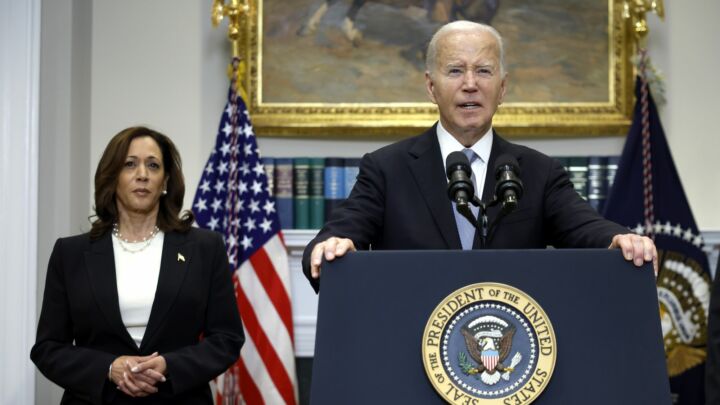Women are more than our hormones
Today’s obsession with menopause, menstruation and other bodily functions is taking womankind backwards.

Want to read spiked ad-free? Become a spiked supporter.
‘Natural’ has to be one of my least-favourite words. I associate it with the kind of half-wits who don’t use deodorant, get excited about trees and believe that before we all went to live in cities, no one ever got ill. I suppose the average age of death was 34 in the 18th century because people were just keeling over out of sheer, molten happiness? Even if you made it to 40, you could expect to be in pain a lot of the time. If you were a woman, an agonising death during childbirth was highly likely. Still, there were no E-numbers in the food back then, so lucky them!
When you hear women banging on the benefits of nature, you have to wonder if they’re raving masochists. I’ve always reckoned that a fun part of being a modern broad is attempting to outwit that boring, old bint Mother Nature for as long as one can, in all sorts of ways from contraception to hair dye. Of course, obsessing about the way one looks can also be a trap. Witness the weird development of preteen girls spending a fortune on skincare and teenage girls having cosmetic surgery. But artifice is often a reasonable rebuke to the bovine mediocrity that being ‘natural’ can engender.
Ironically, capitalism, being the crafty little shapeshifter it is, has been selling us stuff under the pretence that it’s ‘natural’ for years. You can see everything from ‘natural’ breakfast bars to ‘natural’ shampoo, often rammed with chemicals, on the supermarket shelves. Being natural is great, goes the message. And guess what? We can flog you stuff to make you even more natural than you naturally are!
Along these lines, I’ve been irked recently by a new Holland & Barrett advert that harps on about hormones:
‘You’re hormonal! Who’s hormonal? We’re all hormonal – that’s normal. It’s time to change the way we think about our hormones and learn how to work together with them.’
‘Balance your hormones in seven natural steps!’, Holland & Barrett encourages us in an article on its website. ‘Discover seven natural ways to help prevent the hormonal see-saw!’, it continues. This is then followed by the inevitable instruction to ‘Shop women’s health’. Of course, these products are not so natural that you can get them for free. Oh, and the shop chain has recently trained up 600 ‘women’s health coaches’ or, in other words, sales assistants who will flog you even more ‘natural wellness’ rubbish.
Though hormones are a marker of adulthood, fussing about them has become yet another way to treat women like children. Just look at the endless chatter about menopausal ‘brain fog’ and the arrival of menopausal ‘crying rooms’ in the workplace. I found it repellent that when poor Nicola Bulley went missing last year, Lancashire Police informed us – like some blabbermouth gossiping over a fence – that she was ‘struggling’ with issues such as alcohol and the menopause. Women, eh? Always wandering off. It’s their hormones, lord love ’em! I find it very hard to imagine that a man who went missing would be described as ‘struggling’ with baldness and a mid-life crisis.
It’s not long since women were prevented from entering a whole range of professions because it was thought that they were too emotional to be trusted with flying a plane or studying further maths. Our wandering wombs were said to make us incapable. Tellingly, in a 1912 letter to The Times entitled ‘Letter On Militant Hysteria’, Sir Almroth Wright, a fierce opponent of women’s suffrage, wrote:
‘For man the physiological psychology of woman is full of difficulties. He is not a little mystified when he encounters in her periodically recurring phases of hypersensitiveness, unreasonableness and loss of the sense of proportion… It leaves on his mind an eerie feeling when he sees serious and long-continued mental disorders developing in connection with the approaching extinction of a woman’s reproductive faculty. No man can close his eyes to these things; but he does not feel at liberty to speak of them.’
Now everybody speaks of them. But though some high-profile women have tried to present banging on about menstruation or the menopause as some sticky kind of feminism, I’m wary of campaigns that portray females as troublesome bundles of leakage and weakness. If I was a boss looking to hire, I probably wouldn’t choose the candidate who I was forewarned might burst into tears if I told her to pull her socks up.
For some of us, it’s a blessing when our hormones die down. The menopause is not the insurmountable affliction it’s so often made out to be. It’s more like finally being unchained from a wild animal. Although the violent (more than 70 per cent male) and sexual (98 per cent male) crime convictions suggest that testosterone is the problem hormone anyway, if we are forced to pick one. Yet it is women who are invariably depicted as slaves to their hormones.
When I was a girl in the 20th century, no one mentioned bodily functions. Now you can’t get away from them. The latest ghastly cavalcade of oversharing is the host of Z-listers lining up to encourage us to poke about in our own excrement, lest something nasty be lurking in it. ‘Poo’ was once a word which only sniggering children used – now everybody says it.
Has all this frank and fearless chatter about intimate subjects made us a more mature, resilient and capable people, as the enemies of the stiff upper lip always presumed it would? Hardly. We’re currently facing a young generation that finds full stops intimidating. We laugh at the idea of the Victorian fainting couches now, but the era that invented the crying room really doesn’t have any right to consider itself superior. On the contrary, now we really do have something to cry about.
Julie Burchill’s new play, Making Marilyn, co-authored with Daniel Raven, will be at Brighton Palace Pier in May. Get tickets here.
Picture by: Pexels / CoWomen.
To enquire about republishing spiked’s content, a right to reply or to request a correction, please contact the managing editor, Viv Regan.









Comments
Want to join the conversation?
Only spiked supporters and patrons, who donate regularly to us, can comment on our articles.